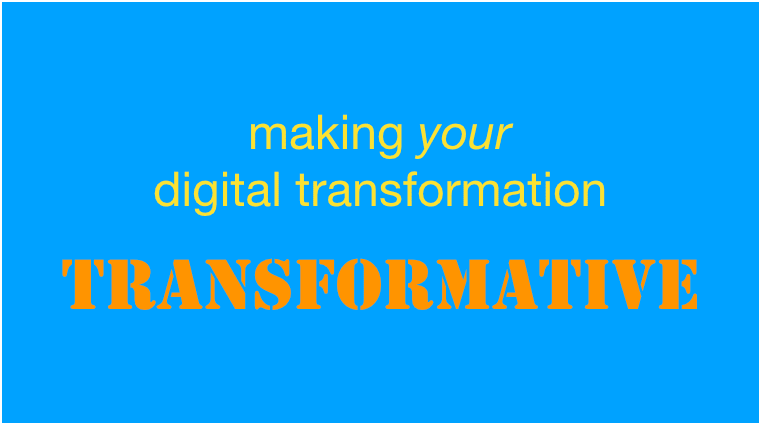Don’t you agree that these are exhilarating times? So many of the major companies I work with are in the throes of major upheaval. Change is everywhere. Digital transformation programmes are in action all over the place. But are businesses transforming appropriately? Are there results to show for their efforts? As my pal Sam Villa likes to say:
Change is for sure. Growth is the option.
But is there growth? In these dynamic times, even journeymen employees are having to re-evaluate and adjust their dyed-in-the-wool habits. So, as we roll out 2018 with all the digital transformation programmes afoot, I am looking forward to significant material change. I expect to see change in the way businesses are being run, but I also expect to see widening deltas between the winners and losers. As Kevin Kelly said brilliantly:
“The future happens very slowly and then all at once”
I am expecting 2018 to be an even more rock’n’roll year, with huge unknowns and events fostering doubt, chaos and opportunity, including volatility in the stock market, cryptocurrencies and inflation, the threats of cyber hacks, political instability and terrorism; and, closer to home, the denouement of Brexit. For business, in such a climate, it will be harder and harder to see straight, unless, that is, they have a firm grip on their North. The competition is at once within each industry, and without the industry. It’s also between industries. And yet, with all the furious activity, so many companies still seem to be “behind the eight ball.” Why is that?
To-date, as I traverse companies undergoing digital transformation, here are six of the most common refrains / situations I hear or see:
1/ All words, no action
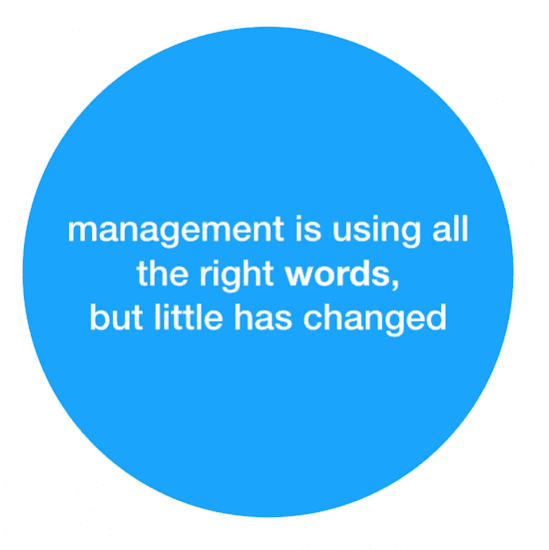
Just like the never-ending holding pattern you hear on customer service helplines, “Thank you for waiting.Your call is important to us. Please hold the line…”; companies are going to have to move from words to actions. As in the fabulous words of Mina, in the song Parole, Parole (gloriously sung by Dalida with Alain Delon – check out the song on Youtube), words don’t count, only actions do.
Management is using all the right words, but little has changed. [tweetthis display_mode=”button_link”]Management is using all the right words, but little has changed. #digitaltransformation #fail[/tweetthis]
Execution is, and will evermore be, strategic.
2/ It’s ALL about the customer?

If more and more companies have cottoned on to the importance of a customer-centric operation (prompted by the powerful mission and success of Amazon), the challenge is making that promise come alive for customers. Between allocating customers to personas and demographic buckets, it’s rare that the client actually feels the difference.
Making the business (more) #customercentric, but does the customer feel the benefits yet? [tweetthis display_mode=”button_link”]Making the business (more) #customercentric, but does the customer feel the benefits yet? — my #digitaltransformation #experience[/tweetthis]
3/ Our people are our most important asset
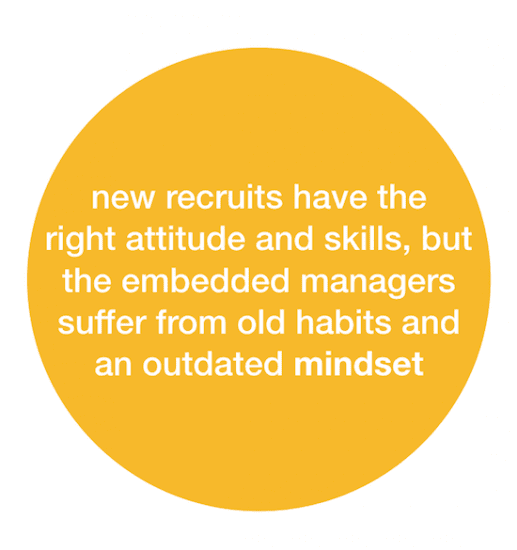
The role of Human Resources is absolutely strategic in the digital transformation process. That’s because it is, above all, a question of mindset and culture.[tweetthis]The role of Human Resources is absolutely strategic in the digital transformation process. That’s because it is, above all, a question of mindset and culture.[/tweetthis] Hiring and retaining the best talent is vital, especially for skills that big companies have not had a good track record in recruiting. There’s also the need to move/get rid of the dead wood. Finally, there is the requirement to upgrade the digital IQ and provide appropriate learning tools, platforms and content for continuous learning.
New recruits have the right attitude and skills, but the embedded managers suffer from old habits and an outdated #mindset [tweetthis display_mode=”button_link”]New recruits have the right attitude and skills, but the embedded managers suffer from old habits and an outdated #mindset — my #digitaltransformation #experience[/tweetthis]
4/ Change through chaos is … chaotic
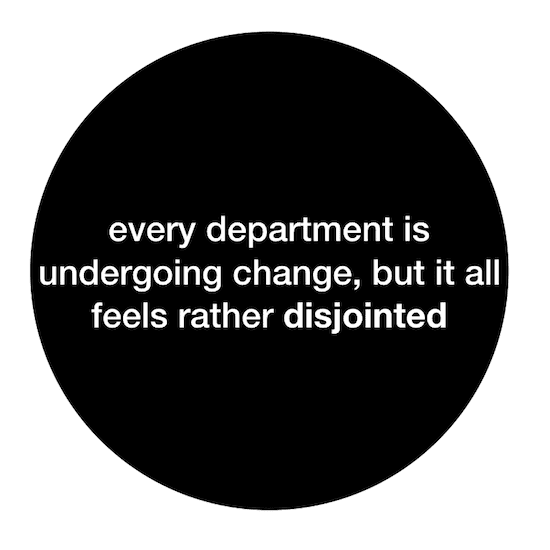
Because every department in the company is concerned by digital transformation, everyone feels under pressure these days. Funnily enough every department believes they can justifiably say: “Ours is the most difficult to transform…” With all the transformation projects occurring simultaneously, it’s very easy to lose your Northerly setting. Under too much stress, people will bring out their more defensive, reptilian brains and behaviours.
Every department is undergoing change, but it all feels rather disjointed [tweetthis]Every department is undergoing change, but it all feels rather disjointed — my #digitaltransformation #experience #strategy[/tweetthis]
5/ In theory, but in practice…
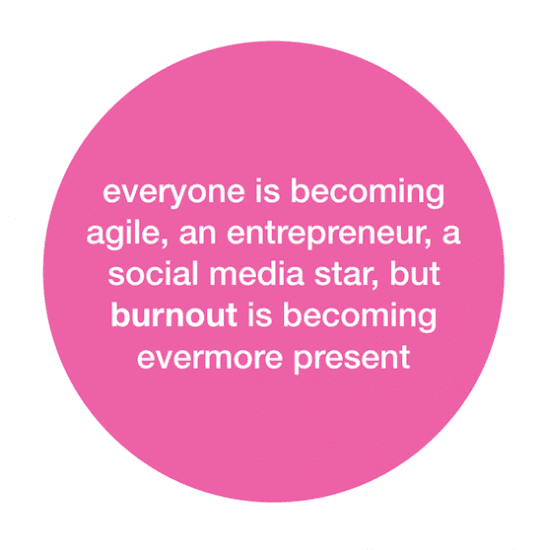
For some, terms such as “agility” and “entrepreneurialism” (much less intrapreneurialism) are just buzzwords. For others, the good intention is absolutely there. However, for the all the change and the hamster-running-in-the-wheel, the risks of burnout have never been more pressing. HR again has a vital role in helping to gauge wellbeing and help employees learn to push back when necessary.
Everyone is becoming agile, an entrepreneur, a social media star, but #burnout is becoming evermore present [tweetthis]Everyone is becoming agile, an entrepreneur, a social media star, but #burnout is becoming evermore present — my #digitaltransformation #experience[/tweetthis]
6/ Legacy systems rule…
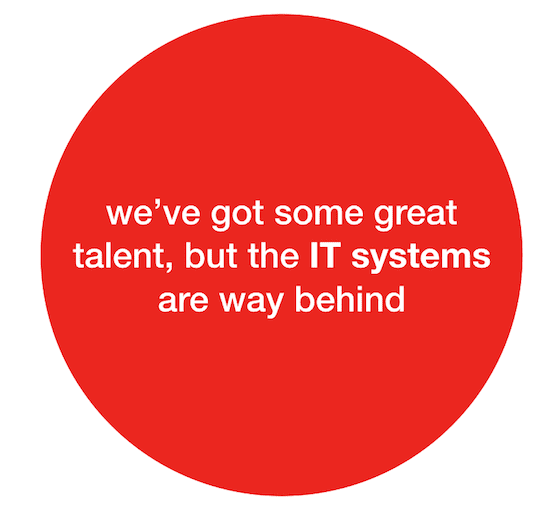
The reality is that most big organisations have to deal with legacy systems. Getting new IT systems takes investment and, more importantly, time and training to adjust to. However, there are multiple and more significant issues than legacy IT, the biggest of which is the legacy mindset. People in higher management believe that the successful methods of the past will bear their customary fruit in the future. That just doesn’t work any longer. Another challenge are the legacy financial systems, such as the way the budget is constructed or the promotional calendar needs to be anniversaried. But when it comes to hiring and retaining great young talent, it’s no use trying to attract them with Lotus Notes, Blackberry phones, poor wifi and massive internal firewalls.
We’ve got some great talent, but the IT systems are way behind [tweetthis]We’ve got some great talent, but the IT systems are way behind — my #digitaltransformation #experience #IT #legacy[/tweetthis]
Which of the six statements above resonates most for you? Which other ones have you heard?

